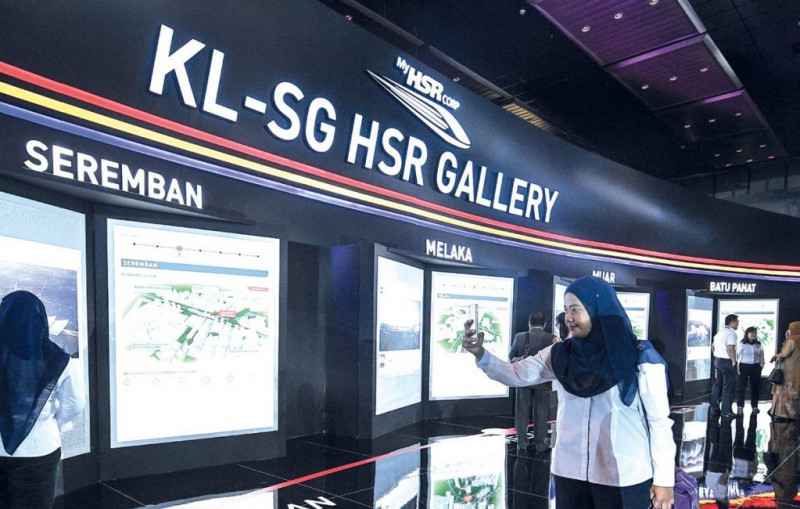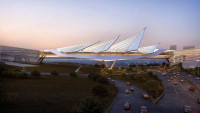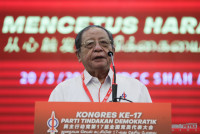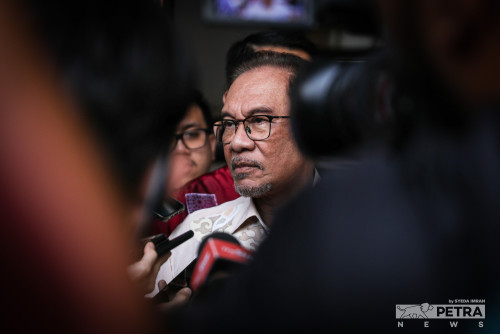KUALA LUMPUR – The revival of the Kuala Lumpur-Singapore high-speed rail (HSR) project could be the first in the world to be fully funded by the private sector.
MyHSR Corporation Sdn Bhd (MyHSR) chairman Datuk Seri Fauzi Abdul Rahman said the government has given the mandate for MyHSR to scrutinise suitable suitors from the private sector to put the delayed project back on track.
“Local or international private companies are invited to realise the project and we have launched a request for information (RFI) process to enable the private sector to formally submit a concept proposal in the next three months,” Fauzi said at a briefing session with the media.
“And if anyone is interested in financing this project, it means they know that it is an investment and capable of providing good returns in the long run,” he pointed out.
When asked about the expected cost to revive the high-impact project, Fauzi said: “For now, the cost to restart it cannot be determined because this depends on the proposal submitted by private companies.”
“The cost will definitely be higher than the previous plan (before the cancellation) and we cannot assess for now because many factors have changed.
He also pointed out that the RFI process will provide the picture of whether the HSR was a viable project for local companies and the global rail industry.
Fauzi said upon the completion of the non-binding RFI, “all proposals will be submitted to the government for evaluation before the request for proposal commences.”
Asked if the multi-billion-ringgit project could restart before the next general election, Fauzi stated that the government has not set a time frame for the project.
“It will be determined by the proposals and possible design changes by the prospective companies,” he said, adding that a new alignment could be a possibility.
For the record, Taiwan’s high-speed train construction and operation linking Taipei and Kaoshiong was 79% financed by the private sector, followed by Indonesia’s inaugural high-speed train project connecting Jakarta and Bandung with 75% funded by China Railway Construction Corp, the United Kingdom (Channel Tunnel Rail Link) at 70%, and Thailand’s EEC three airports rail projects at 52%. The four HSR developments only utilised the respective government’s funds for land acquisitions.
MyHSR chief Datuk Mohd Nur Ismal Mohamed Kamal asserted that Malaysia will enjoy the long-term economic benefits if the mega infrastructure project was a reality.
“This project is not all about high-speed rail. This is about giving the added value and economic boost to the country and increasing Malaysia’s competitiveness at the global stage.
“HSR is significant for the integration of city planning between KL to southern corridors onwards for wider economic growth,” he said.
Based on MyHSR’s study over the 50 years of economic benefits that include the construction and operational phases, the projection on the original HSR project was expected to create RM1,011 billion employment opportunities, RM252 billion in development output impact, and RM145 billion to be generated from international tourism.
Looking at the progress of transport infrastructure in Asia in the last decade, it is noted that Malaysia has been lagging behind in creating high-impact projects and attracting foreign investment.
“Neighbouring countries around us such as Thailand, Indonesia, Taiwan, and even Vietnam have woken up to this and started to do things on their own for faster and efficient (rail) connectivity and will grow by leaps and bounds.
“If these countries become successful, who is going to come and invest in Malaysia? Imagine what will happen to us if we don’t have HSR,” said Nur Ismal.
At present, there are 19 countries globally operating HSR at 56,0119km and undergoing construction (31,857km).
He explained that while most of the high-speed rail projects around the world were public-led, “some of these countries have lower per capita income than Malaysia and they used the public-private partnership approach.”
“It is clear that seven countries have a clear vision and how they want to stimulate growth which include embarking on HSR connectivity,” said Nur Ismal.
MyHSR’s head of commercial and economy Mohd Ikhsan Ahmad stated that no HSR projects around the world so far had been fully funded by the private sector.
“The KL-Singapore HSR project will be undertaken via a design, fund, build, operate, and transfer model without government funding and guarantee,” said Ikhsan.
Malaysia and Singapore had signed a bilateral agreement to implement the project on December 13, 2016 and it aims to deliver a travel time between Singapore and KL of within 90 minutes.
The project was slated to cost RM110 billion at the time when Malaysia and Singapore jointly announced its termination in January 2021 when the two countries failed to reach an agreement on changes proposed by Malaysia before the project agreement expired in December 2020.
The original 350-km high-speed rail alignment with seven stations was targeted for completion in 2026.
However, since then, there had been a series of discussions and both governments were keen on reviving the project as long as it involved private investment.
In the past 14 months, it is understood that MyHSR had been conducting engagement sessions with technical and commercial consultants to understand the latest industry readiness, level of interest, and capabilities to ensure the sustainability of the project.
It is learned that six local companies last year were invited to resuscitate the project that include MMC Corporation Bhd, Gamuda Bhd, Malaysian Resources Corp Bhd, Berjaya Rail Sdn Bhd, YTL Construction, and WCT Holdings Bhd. – The Vibes, July 13, 2023



















.jpg)
